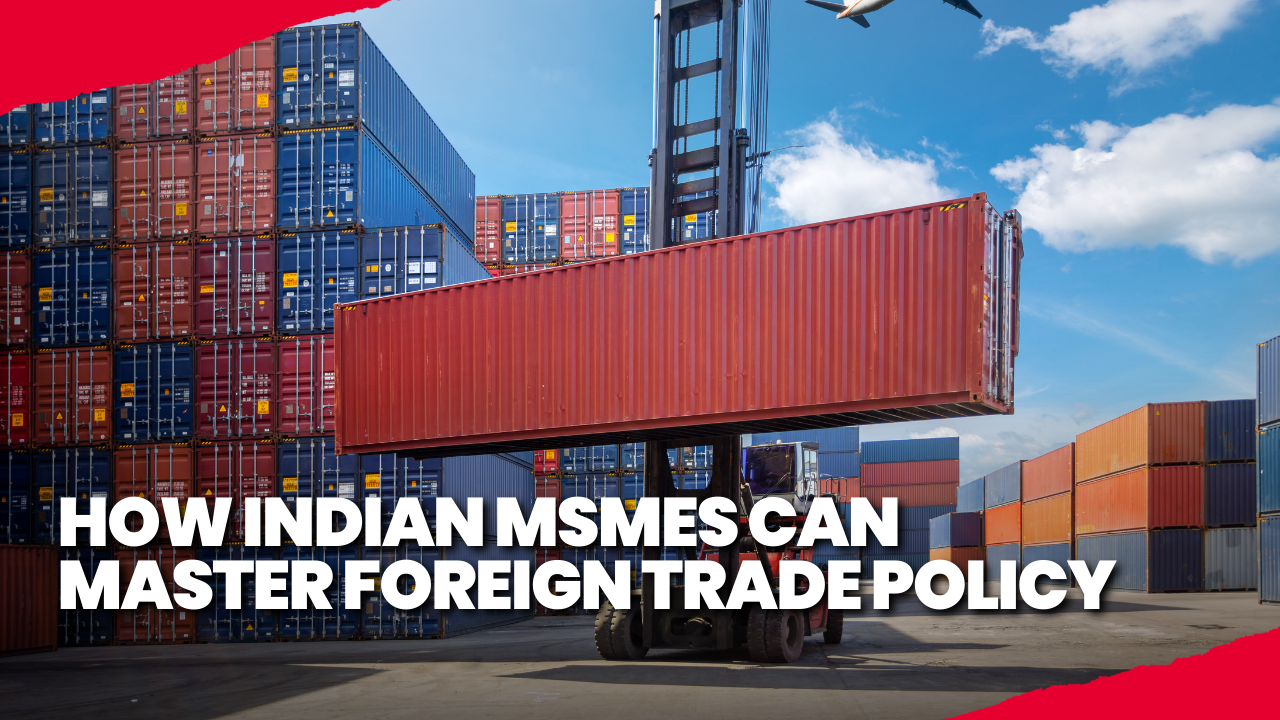
Will Indian SMEs be able to dominate international markets? Knowing about India’s Foreign Trade Policy can be helpful for small businesses now that the country wants to develop into a $1 trillion export economy.
There is still a lot of confusion for many MSMEs about policies, documents, advantages, and schemes. The good news is that the government’s new Foreign Deal Policy (2023 onwards) has made it easier than ever for micro, small, and medium-sized businesses to deal with other countries. There has never been a better time to start exporting, with easier procedures, free schemes, and digital tools available. This MSME export guide clearly explains all the information you require to use the Foreign Trade Policy and begin profiting from the different MSME export schemes in India.
What is the Foreign Trade Policy (FTP)? Why is it important?
The Directorate General of Foreign Trade (DGFT) created the Foreign Trade Policy, which is a broad plan to increase exports, make licensing easier, help Indian producers, and keep the country competitive in international markets.
The new FTP focuses on going digital, making it easier to do business, and lowering the costs of compliance for exporters, especially small and medium-sized enterprises. These businesses want to grow beyond national lines, make additional funds in foreign exchange, and employ additional workers.
This MSME export guide helps businesses that want to sell their products and services in other countries learn about FTP’s advantages, rules for having them, and chances for growth.
The best MSME export schemes you need to know about
This is a very important part of the MSME export guide, especially for people who are exporting for the first time. A lot of MSME export schemes are made to help small businesses go internationally. You might want to check these out.
Remission of Duties and Taxes on Exported Products (RoDTEP)
This plan gives you back hidden taxes and fees that you can’t get back any other way, which directly helps your bottom line.
EPCG Scheme
The Export Promotion Capital Goods Scheme lets capital goods for production come in duty-free, which helps the country become more modern.
Advance Authorization
Advance Authorization makes duty-free imports of raw materials needed for export production happen, which saves money.
Market Access Initiative (MAI)
The Market Access Initiative (MAI) gives small and medium-sized businesses (MSMEs) funds to help them go to foreign trade shows, exhibitions, and buyer-seller meetings.
Also Read This: Exporting From the Sea: MPEDA’s Online Registration & Subsidies
What are the successful Trade Tips for MSMEs
To get the most out of the Foreign Trade Policy explained, MSMEs can’t just depend on government schemes; they also need to get stronger in their own right. With these valuable tips, the MSME export guide provides a set of steps that can be followed to go universal. Here are some suggestions.
1. Register with DGFT
Obtain an Import Export Code (IEC); it is your pass to participate in international trade.
2. Use tools for export analytics
You can now find export demand data, competitor research, and buyer trends on a number of websites that can help you make smart choices.
3. Work with an Export Promotion Council (EPC).
EPCs can help you with technical issues, keep you up to date on policy changes, and place your company in contact with verified foreign buyers.
4. Inform Your Employees
Make an investment in education on compliance, shipping logistics, and certifications linked to exports.
Common Challenges and How the FTP Helps Solve Them
| Challenge | FTP-Backed Solution |
| Complex compliance | Internet portals and simplified documentation |
| Lack of funds | Subsidies through MAI and interest equalization |
| Poor international visibility | Export Excellence Zones and EPC support |
| Outdated machinery | EPCG scheme for capital upgrades |
What FTP Means for MSMEs
Since the start of FTP 2023-
- More than 18,000 MSMEs signed up to grow into new exporters.
- In less than 18 months, MSMEs have exported more than $8 billion.
- Most RoDTEP returns are given back within 30 days.
- India moved up in the Foreign Innovation Index, which was helped in part by policies that encourage exports.
It’s clear that MSME export plans are more than just rules; they also help businesses do better.
Wrapping It Up
MSMEs may compete with the best in the international marketplace if they have the right tools and assistance and know how the Foreign Trade Policy works. With its flexible export programs, easier paperwork, and help with getting foreign funding, India’s FTP is just what every small business needs to get started.
This MSME export help is just the starting point. When businesses take smart steps forward toward innovation, market growth, and long-term international trade, that’s when real growth happens.
If you run a small or medium-sized business and want to go global, now is the time. Go deep into the world of MSME export schemes, understand the power of the Foreign Trade Policy, and use this MSME export guide to make your business succeed internationally.
FAQs
MSMEs should first sign up with the DGFT and get an Import Export Code (IEC), which is needed to do business internationally.
Yes, schemes like RoDTEP, EPCG, Advance Authorization, and MAI are meant to help MSMEs lower their export costs and get better access to markets.
Yes. The 2023 Foreign Trade Policy explains that the primary objectives are to make compliance easier, motivate technology, and provide MSME export schemes that allow more people to trade internationally.
Also Checkout Our YouTube Channel: @limeinstituteofexportimport






